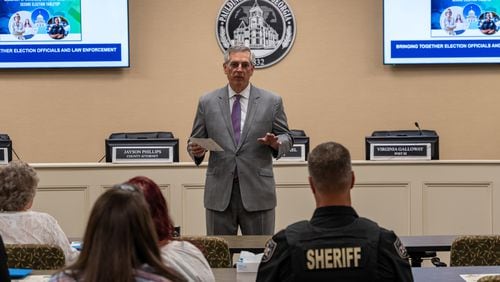It’s common in professional sports for decision-makers to come from a world where they were better with numbers than they ever were with a ball or a bat. So it shouldn’t come as a surprise that the individual arguably exerting the greatest influence on the Braves’ roster decisions in recent weeks was cut from his high school baseball team as a freshman and gave himself this scouting report: “I was fat. I couldn’t hit. I couldn’t run. I couldn’t throw. Outside of that I was great.”
John Hart is the Braves’ executive out front, so he’s the one catching most of the heat for the extreme makeover of a team that might be really good in the distant future but seems somewhat anemic now. But while Hart ultimately is making the decisions, he’s relying on information fed to him from assistant general manager John Coppolella, the fat kid from high school (who’s actually no longer fat).
This is significant because Hart has given Coppolella significantly more responsibility and a louder voice in all personnel decisions than he ever had under Frank Wren, who most would tell you had a tendency to pay attention only to the voice in his head.
Hart agreed to come out of semi-retirement to groom Coppolella for the GM’s job (expectation: two or three years). But a case could be made that Coppolella is some semblance of the GM now.
“I told John Schuerholz I wouldn’t take the job if he wasn’t here,” Hart said. “He’s been an asset in everything we’ve done. I make the decisions, but Coppy has a tremendous amount of input. He’s a big part of everything that has happened.”
So blame him. Or credit him. We’ll know soon enough which.
The 2015 Braves are going to be as starved for runs and wins as some suggest or the greatest, unlikely success story since the 2014 Kansas City Royals. Speaking of whom …
“We traded away three guys with power,” said Coppolella, referencing the mostly unpopular deals that brought mostly prospects and sent away Justin Upton, Jason Heyward and Evan Gattis. “But the team that finished last in home runs last year played in Game 7 of the World Series. There’s more than one way to skin a cat. We feel like we’re going to have a good team.”
Coppolella was one of those baseball-obsessed kids who couldn’t play the game. So that gives him something in common with most people in the press box.
“My senior year in high school, I was 6-0, 280 pounds,” he said. “My freshman year in college I was 6-2, 140 pounds. I lost a ton of weight. It was for this girl. I wanted to ask her out, but it turned out she didn’t want to go out with me, whether I was fat or thin.”
Somehow, life has worked out just fine.
He is married with three children. He graduated magna cum laude with a business degree from Notre Dame, accumulating a mountain of debt in school loans that he’s just now paying off. He worked his way up from no-pay internships to small-pay internships to being the eager young guy in the New York Yankees’ personnel department who drew the admiration of George Steinbrenner (no easy feat).
When he was at Notre Dame, he was so desperate for any job in baseball that he wrote letters to 150 teams, from low-A to the majors.
“I spent more money on stamps than food that year,” he said.
His net return: eight form letters.
Eventually he talked his way into a summer internship with the Single-A Lake Elsinore (California) Storm and worked a second job at Golden Baked Hams so he could pay for gas and car insurance as he made the daily 90-minute commute from his parents’ home in Laguna Hills.
Coppolella: “I took the 5 to the 55 to the 91 to the 15.”
I understood. I speak SoCal freeway English.
After graduating from Notre Dame, he took a $90,000-a-year job working in logistics at Intel, only to leave that in 2000 for an $18,000-a-year gig as “baseball operations assistant” (statistical analysis) with the Yankees. That went over well with his parents. Not really. But he felt like he was home.
The Braves hired him in 2006 and he has continued to climb the ladder, blending his expertise in analytics with the more traditional perspective of old-school scouting.
As for this winter’s transactions, Coppolella’s position is as you would expect. He defends the moves and echoes Hart’s comments that the Braves’ deals have been about next season and beyond.
When asked about criticism from team president John Schuerholz that the organization’s farm system slipped considerably under Wren, he responded only, “I think we need to get better now. But I think we always need to get better.”
Do you agree with the criticism? “I have to say no comment to that.”
While player development fell off — and theoretically Coppolella should take some of the blame for that since he works in personnel — there were other factors. A number of prospects, including Heyward, Freddie Freeman, Andrelton Simmons, Julio Teheran and Craig Kimbrel — graduated to the majors. A string of 89-to-96 win seasons (2010-13) meant the Braves drafted lower. They made some deadline deals that impacted the farm system.
But here’s what Coppolella wouldn’t say: Wren made all the decisions. His style grated on the player-development staff. Several valuable members left, notably former scouting chief Roy Clark, who worked for the Braves for 22 years before leaving in 2009 to join former Braves executive Stan Kasten in Washington (three years after Kasten first asked).
It’s no coincidence that with Wren gone, Clark came back in October.
Coppolella has a platform now. The players acquired in the trades are the result of his analysis. Hart also sent Coppolella and manager Fredi Gonzalez “to sell” free-agent outfielder Nick Markakis on the Braves’ plan.
Coppolella often uses words such as “value” when discussing trades, “contact rates” when analyzing players, “balance” when discussing the roster.
“There is more talent (in the organization) now than there was before this offseason,” he said.
He’s in a higher profile position now, but doesn’t relish being the focus.
“At the end of the day, this isn’t about me. It’s about the Braves’ organization,” he said.
Ultimately, he and the team will be graded the same way: on wins.
About the Author





